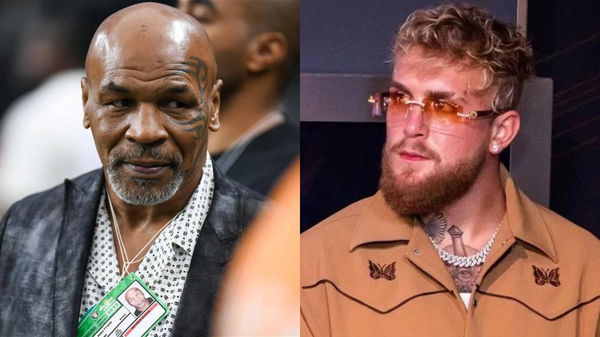
via Imago
Image Credits: Imago

via Imago
Image Credits: Imago
So, everyone knows Mike Tyson really cherishes his face tattoo, right? But guess what? The guy who actually inked it, S. Victor Whitmill, seems to love it even more. He even went ahead and sued Warner Brothers over them, for using it without his permission! Crazy, huh?
Now, here’s where things get interesting. Jake Paul, aka ‘The Problem Child,’ was about to face a similar legal mess. He’s gearing up for a big fight with Mike Perry on July 20th in Tampa, and then he’s got another huge match lined up against Mike Tyson in November. But, here’s the twist – he managed to dodge that whole legal mess somehow. How? Let’s find out.
ADVERTISEMENT
Article continues below this ad
Why did S. Victor Whitmill file a lawsuit against Warner Brothers?
Alright, here’s the scoop on S. Victor Whitmill and his legal tango with Warner Bros. over Mike Tyson’s iconic face tattoo in The Hangover: Part II. Whitmill, the tattoo artist who originally inked Tyson’s tattoo, wasn’t too thrilled when he saw a very similar design in the movie sported by Ed Helms’ character. Therefore, he went ahead and sued Warner Bros., claiming they ripped off his copyrighted tattoo without his permission.
Apparently, Whitmill had Tyson sign something back in the day, acknowledging that Whitmill owned the rights to the design. Armed with this agreement and copyright registration, Whitmill argued that Warner Bros. had no right to reproduce his work without crediting him or getting his go-ahead.
View this post on Instagram
The lawsuit dropped right before “The Hangover: Part II” was set to hit theaters over Memorial Day weekend, aiming to put a halt on its release. Whitmill wasn’t messing around—he wanted to make sure Warner Bros. didn’t profit off of his tattoo design.
Warner Bros. tried to argue back, saying the tattoo might not be original enough for copyright protection or that its use in the film was fair game as parody. But Whitmill had his ducks in a row with all his paperwork and even had photos of him tattooing Tyson to back up his claim.
What’s your perspective on:
Jake Paul dodges a lawsuit over Tyson tattoo—Is celebrity privilege at play here?
Have an interesting take?
Even though the court refused to halt the release of the film, they did see merit in Whitmill’s lawyer’s arguments. After a lengthy all-day discussion between the two parties, Warner Bros decided to settle the case out of court. Following their settlement, Whitmill’s attorney released a statement that read: “Warner Bros. and Mr. Whitmill have amicably resolved their dispute. No other information will be provided.”
Nevertheless, the whole thing sparked a bigger debate about who owns the rights to tattoos when they appear in movies and media. It was a big deal because it could set a precedent for how studios handle copyrighted tattoos in the future. All said and done, it was a tense legal showdown that made everyone think twice about putting tattoos in movies without checking with the original artists first.
How did Jake Paul escape a lawsuit?
Jake Paul sure knows how to stir things up, especially with that move of replicating Mike Tyson’s face tattoo for the promo of their Netflix fight. It got people talking, wondering if he’d face the same legal heat that Warner Bros. did over the tattoo in The Hangover: Part II.
ADVERTISEMENT
Article continues below this ad
But here’s the thing: Jake Paul’s use of the tattoo was temporary—it was just a fake tattoo. That’s a big difference compared to Warner Bros. using a permanent depiction in a movie made for profit. Temporary tattoos for promotion often fall into a gray area in copyright law, especially when they’re not directly profiting from the tattoo itself.
View this post on Instagram
ADVERTISEMENT
Article continues below this ad
Another angle is the argument of transformative use. Transformative use means changing the original work to create something new or send a different message. Jake Paul used the tattoo as part of his hype for a potential fight with Mike Tyson, which some might see as a kind of parody or satire rather than a straightforward copycat move for money.
So, despite the eyebrow-raising stunt, Jake Paul might have skirted legal trouble by keeping it temporary, tying it into his promotional antics, and removing it soon after the promo release. Since there hasn’t been a lawsuit slapped on him like Warner Bros., it seems his approach—temporary, promotional, and possibly transformative—might have helped him dodge a legal knockout. What do you think about Jake Paul’s tattoo tactic?
ADVERTISEMENT
ADVERTISEMENT
ADVERTISEMENT
ADVERTISEMENT


Jake Paul dodges a lawsuit over Tyson tattoo—Is celebrity privilege at play here?